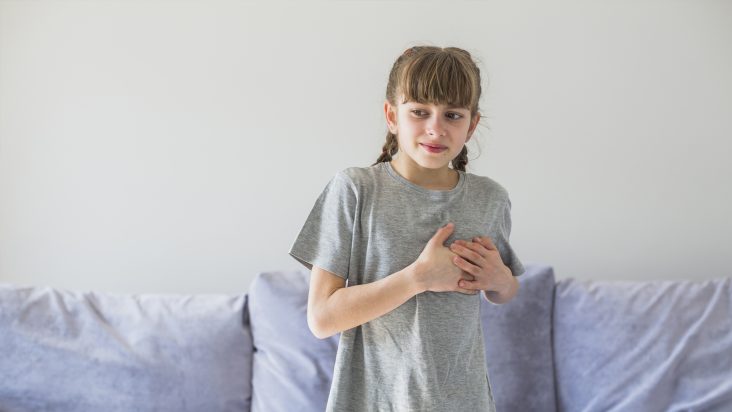Palpitations in Kids: What’s Normal and What’s Not?
“My child says their heart is fluttering.”
“It feels like it’s skipping a beat.”
“They complain of a racing heart after playing.”
These are some of the most common concerns we hear from parents at KidsHeart clinics in Dubai, Abu Dhabi, and Al Ain. When a child experiences palpitations—an awareness of their heartbeat being unusually fast, strong, or irregular—it can be unsettling, especially if you’ve never heard them complain about it before.
But before you panic, it’s important to know: not all palpitations are dangerous. In fact, many are entirely normal. The key is knowing when to observe and when to investigate further.
What Are Palpitations?
Palpitations are sensations where the heartbeat feels faster than usual, irregular, or more noticeable. Some children describe it as:
- Fluttering in the chest
- Heart pounding or racing
- Feeling like the heart “skipped” a beat
These sensations can last for seconds or minutes and may come with other symptoms—or none at all.
When Palpitations Are Harmless
In many cases, palpitations in children are caused by:
- Physical activity or sports
- Excitement, anxiety, or fear
- Fever or dehydration
- Caffeine or sugar intake (including energy drinks or chocolate)
- Fatigue or lack of sleep
These are considered benign palpitations, and they usually settle down on their own. They are most common in school-age children and teens, particularly during growth spurts or hormonal changes.
If your child occasionally experiences these symptoms—especially at rest, or in relation to emotions—it’s often safe to observe and reassure.
When You Should Speak to a Pediatric Cardiologist
There are times when palpitations may signal an underlying heart issue that needs attention. You should seek evaluation if your child:
- Experiences palpitations frequently or without obvious triggers
- Has episodes that last more than a few minutes
- Faints, feels dizzy, or complains of chest pain during or after palpitations
- Has a family history of heart rhythm disorders or sudden cardiac arrest
- Complains of heart racing during sleep or while sitting still
In these cases, a pediatric heart checkup can help determine whether the palpitations are related to arrhythmias, structural heart issues, or other medical conditions.
Explore our Pediatric Arrhythmia Management service to see how we assess and treat irregular heart rhythms in children.
What Does a Cardiac Evaluation Involve?
At KidsHeart, our team uses a combination of non-invasive tests and child-friendly techniques to investigate palpitations. A typical workup may include:
- Medical history and a review of symptoms
- Electrocardiogram (ECG) – a quick, painless test to monitor heart rhythm
- Echocardiogram (heart ultrasound) – to check heart structure and function
- Holter monitoring – where a portable device records your child’s heartbeat for 24 to 72 hours
These tools help us detect patterns that may not appear during a single clinic visit, especially if the palpitations come and go.
Learn more about how we use ECG Holter Monitoring to uncover rhythm issues that might otherwise go undetected.
Could It Be Related to Stress or Anxiety?
Absolutely. In today’s fast-moving world, many school-aged children in modern days, face academic pressure, extracurricular demands, and screen-related overstimulation. These can all contribute to episodes of anxiety—which often show up physically, through increased heart rate, sweating, or a sense of panic.
If your child has palpitations around exam time, social events, or new situations, emotional stress could be a contributing factor.
In such cases, collaboration between pediatric cardiologists and child psychologists is helpful. Our integrated approach at KidsHeart ensures that emotional and physical health are both considered.
What About Sports and Physical Activity?
One of the biggest questions parents ask is: Can my child with palpitations still play sports? The answer depends on the cause.
- If palpitations are benign, your child can usually participate fully—with some basic monitoring.
- If an arrhythmia is diagnosed, the cardiologist will recommend the safest level of activity and whether restrictions are needed.
Our Sports Participation and Heart Health service provides fitness clearance and stress testing for children who want to stay active safely.
What Parents Can Do at Home
Until your child is seen by a doctor, here are a few simple steps you can take:
- Stay calm and keep your child calm—anxiety can make palpitations worse.
- Record the episode—note the time, what your child was doing, and any symptoms.
- Encourage hydration and sleep—both are essential for heart regulation.
- Avoid caffeine or energy drinks, which can trigger fast heartbeats.
- Don’t ignore your instincts—if something feels off, get it checked.
When to Act Fast
If your child is experiencing palpitations with fainting, severe chest pain, or trouble breathing, seek emergency care immediately. While rare, these can be signs of a serious cardiac rhythm disturbance.
Gentle, Expert Care Across the UAE
At KidsHeart, we understand how worrying heart symptoms in children can be. That’s why our Pediatric Cardiology team in Dubai, Abu Dhabi, and Al Ain focuses on accurate diagnosis, clear communication, and child-friendly care.
Most of the time, we’re able to provide reassurance and guidance that helps parents and children move forward with confidence.
If your child has been complaining of a fluttering or racing heartbeat, even occasionally, don’t wait for it to happen again.
we’re here to listen, assess, and support your child’s heart health every step of the way.

